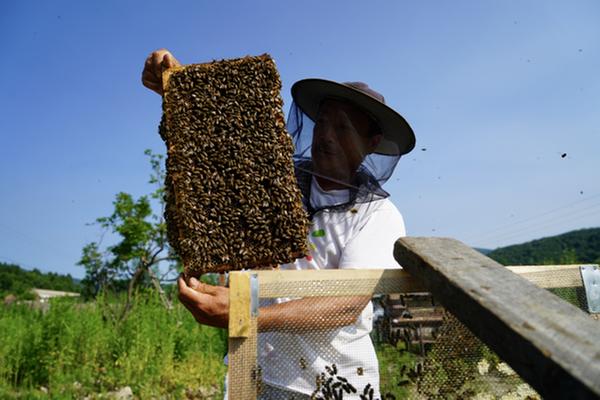China's Siberian tigers come in from the cold

 |
| Sun Yanfa, a retired forestry worker, keeps bees in Wangqing, Jilin. [Photo by Zhang Zefeng/China Daily] |
One of the national parks, which straddles Jilin and Heilongjiang provinces, is scheduled to become a sanctuary for endangered tigers and leopards.
Since 2015, State-owned forest farms in Jilin have shifted from logging to creating green industries, such as tourism, to raise incomes while protecting the environment.
Wang Caijin, who used to work as a logger at the Dahuangou forest farm in Hunchun, was deeply worried when he was forced to quit his job, the only work he had ever known.
"Loggers who are not allowed to log are like farmers who don't have land to farm," he said.
Like many of his former colleagues who have stopped logging and become forest rangers, Wang got a job in the forest, assessing potential fire hazards.
The logging ban removed the forestry bureau's main source of revenue, so Wang's salary, which mostly came from government funding, shrank significantly.
To raise incomes and accommodate the rising number of tourists attracted by recently-established scenic spots nearby, the forest farm provided Wang with financial support that enabled him to open a home inn.
The sideline has boosted Wang's income by an extra 10,000 yuan a month, three times the average wage of a forestry worker. He now owns a car and leads a satisfying life.
"For 32 years, logging was my only source of income," he said. "Now, I don't have to rely on labor-intensive work and my income is much higher."
Officials at the Tianqiaoling forestry bureau in Wangqing, near Hunchun, have also transformed the local economy in an ecologically friendly way.
In recent years, the bureau has successfully cultivated 10,000 mu (666 hectares) of seedlings and 8,000 mu of medicinal herbs, including important ingredients of traditional Chinese medicine, such as ginseng.
Incomes are rising as forestry workers take part-time jobs, such as cultivating edible fungi, beekeeping and raising pigs, chickens and frogs.
Last year, the local black fungus industry employed 1,997 workers and generated more than 100 million yuan, according to the bureau.
- Yuyuan Garden lights up with Year of the Snake lantern installations
- New dendrobium orchid species found in Sichuan
- People welcome the New Year across China
- China's railway trips expected to hit 11.5 million on New Year's Day
- Beijing: where ancient traditions meet modern marvels
- Beijing-Tianjin-Hebei 2025 celebrations shine at Zhengding county





































